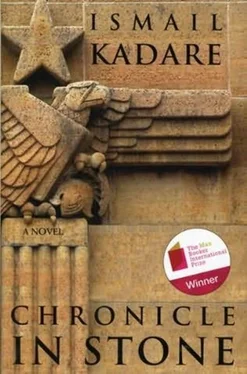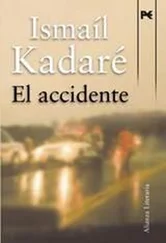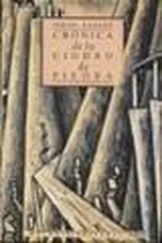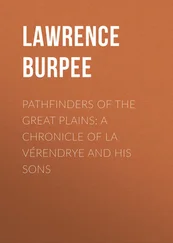Ismaíl Kadaré - Chronicle in Stone
Здесь есть возможность читать онлайн «Ismaíl Kadaré - Chronicle in Stone» весь текст электронной книги совершенно бесплатно (целиком полную версию без сокращений). В некоторых случаях можно слушать аудио, скачать через торрент в формате fb2 и присутствует краткое содержание. Жанр: Современная проза, на английском языке. Описание произведения, (предисловие) а так же отзывы посетителей доступны на портале библиотеки ЛибКат.
- Название:Chronicle in Stone
- Автор:
- Жанр:
- Год:неизвестен
- ISBN:нет данных
- Рейтинг книги:4 / 5. Голосов: 1
-
Избранное:Добавить в избранное
- Отзывы:
-
Ваша оценка:
- 80
- 1
- 2
- 3
- 4
- 5
Chronicle in Stone: краткое содержание, описание и аннотация
Предлагаем к чтению аннотацию, описание, краткое содержание или предисловие (зависит от того, что написал сам автор книги «Chronicle in Stone»). Если вы не нашли необходимую информацию о книге — напишите в комментариях, мы постараемся отыскать её.
Chronicle in Stone — читать онлайн бесплатно полную книгу (весь текст) целиком
Ниже представлен текст книги, разбитый по страницам. Система сохранения места последней прочитанной страницы, позволяет с удобством читать онлайн бесплатно книгу «Chronicle in Stone», без необходимости каждый раз заново искать на чём Вы остановились. Поставьте закладку, и сможете в любой момент перейти на страницу, на которой закончили чтение.
Интервал:
Закладка:
At the same time refugees were returning to the city in small groups from every direction. In a few hours the gigantic half-deserted shell would again be filled with footsteps, murmurs, passionate speeches, gossip, hopes and suffering.
We walked without stopping. We had long since passed the last haystack.
“Let’s turn back,” Xhexho said suddenly, stopping dead. “There’s a ringing in my right ear.”
No one said anything. We walked on. Xhexho went on mumbling for a while.
“Where are you rushing, you unhappy people?” she said tearfully. “To your doom!” An old woman from among the Hankonis told her to shut up. And so she did.
We marched on. It was maybe midnight. We could see nothing. We sensed that boils and tumours had sprouted here and there in the night. Probably knolls and boulders.
It must have been after midnight when we came down to the plain. A black shape loomed near us: the wreck of the Bulldog. There was an acrid smell. Someone must have used it as a latrine.
“Do you remember where you hid the dagger?” asked Ilir.
“Yes,” I told him.
We stopped to rest. Ilir and I went to piss near the downed plane. I never would have believed we could do such a thing.
Day was dawning and little by little the contours of the city were vaguely taking shape. It loomed before us like a sphinx. We weren’t sure what to do. Should we go in or not? Chimneys, rooftops and windows were emerging one after another from the blackened chaos. The spires of minarets and bell-towers and the tin flashings of gable-ends looked like madmen wandering among the roofs in ancient helmets.
We decided to go in. We crossed the river bridge (the sentry post had been abandoned) and took the road. There were no Germans anywhere. Maybe they were holed up in the citadel.
We still had a way to go across uncultivated fields. Suddenly the city rose up right in front of us. High and steep, almost vertical. Looking disdainful. Maybe a bit offended at having been deserted. Signs of the battering it had taken were everywhere: shattered house-fronts, demolished balconies.
We noticed a white patch on the first telegraph pole. As we came closer we saw that it was an announcement. It was still dark and we could barely make out the words. “I order… the arrest of… pers… dead… three… shot… as well as… garrison commander: Kurt Vollersee.”
We were on our way up Varosh Street. A faint light glimmered in the window of Xivo Gavo, the chronicler. Suddenly I felt a hand pull my head and press it against someone’s bosom.
“Don’t look!”
A dark shape was visible on one side of the street. Like a contorted body. I couldn’t really tell what it was. I almost vomited.
Further on no one stopped me from looking. We walked on in a daze. Two dead Italians on the street. Then another.
The hanged man could be seen from far off. At the junction. After a telegraph pole. As we came closer, we saw that it was a hanged woman. An old woman. Xhexho broke into a dull keening.
“Kako Pino,” Ilir whispered.
It was indeed her. Her skinny body swung gently in the wind. On her chest was a white rectangle with one Germanised Albanian word written on it: “saboteur”.
We walked faster. Here was our alleyway. Our house. Mamma has already taken the big key from her pocket. A few more steps. But a body lies on the cobblestones with its head in a pool of blood. On the chest a piece of paper with a few words. Nazo gave a strangled cry. “Maksut!” Her daughter-in-law gazed with indifference at her husband’s corpse, then stepped carefully around it as if afraid of soiling herself with the blood. I couldn’t take my eyes off the piece of paper. It read: “This is how spies will die.” In that handwriting I knew so well, the letters tilted forward as if leaning into wind and rain. It was Javer’s hand.
“Terrible things are going to happen. I told you so,” said Xhexho, before she disappeared down the alleyway.
We all went our separate ways. Nazo and her daughter-in-law started dragging the body towards the door.
My mother had barely put the key in the lock when the door swung open by itself. Grandmother came out like a ghost.
“Come in, come in,” she said in a low voice.
We went in.
“I’ve been waiting for you,” said Grandmother.
“Maksut, out there… in front.”
“I know. They killed him last night.”
“Kako Pino…”
“I know,” Grandmother said again. “They hanged her yesterday.”
We went upstairs together.
“She was on her way to make up a bride. A patrol stopped her in the street.”
“Are people still getting married in times like these?” my mother asked in surprise.
“People get married in all times,” Grandmother said.
“What madness!”
“It seems it was her instruments that aroused their suspicion,” Grandmother said. “They thought the metal things and the tweezers had something to do with bombs. That’s what they say, at least.”
I went to the window and looked out. It was cold. A searchlight threw up a frightening shaft of light, then went out.
German occupation. Greyness. Teutons. Their flag flew from the prison tower. Two s ’s or z ’s, distorted by the breeze.
Outside we could hear Nazo and her daughter-in-law, still dragging Maksut’s body.
“It’s going to be a merciless war,” said Grandmother, putting her hand on my head.
The sound of muffled footsteps came from the street.
“People are coming back,” she said. “They’ve been coming back in groups all night.”
Again the tender flesh of life was filling the carapace of stone.
DRAFT OF A MEMORIAL PLAQUE
A very long time later I came back to the grey immemorial city. My feet timidly trod the spine of its stone-paved streets. They bore me up. You recognised me, you stones. Often, striding along wide lighted boulevards in foreign cities, I somehow stumble in places where no one ever trips. Passers-by turn in surprise, but I always know it’s you. You emerge from the asphalt all of a sudden and then sink back down straight away.
My street, my cistern. My old house. Its beams, floorboards and staircase creaked slightly, almost imperceptibly, with a dry, uniform, almost constant crackling sound. What’s wrong? Where does it hurt? It seemed to be complaining of aches in its bones, in its centuries-old joints.
Grandmother Selfixhe, Xhexho, Aunt Xhemo, Grandma, Kako Pino – all are gone. But at street corners, where walls join, I thought I could see some familiar features, like outlines of human faces, the shadows of cheekbones and eyebrows. They are really there, caught in stone for all time, along with the marks left by earthquakes, winters and scourges wrought by men.
Ismaíl Kadaré


Интервал:
Закладка:
Похожие книги на «Chronicle in Stone»
Представляем Вашему вниманию похожие книги на «Chronicle in Stone» списком для выбора. Мы отобрали схожую по названию и смыслу литературу в надежде предоставить читателям больше вариантов отыскать новые, интересные, ещё непрочитанные произведения.
Обсуждение, отзывы о книге «Chronicle in Stone» и просто собственные мнения читателей. Оставьте ваши комментарии, напишите, что Вы думаете о произведении, его смысле или главных героях. Укажите что конкретно понравилось, а что нет, и почему Вы так считаете.












